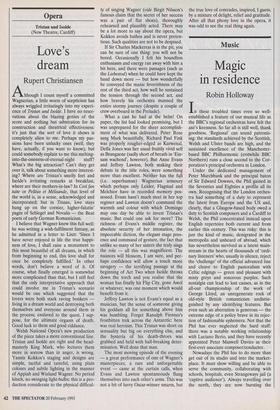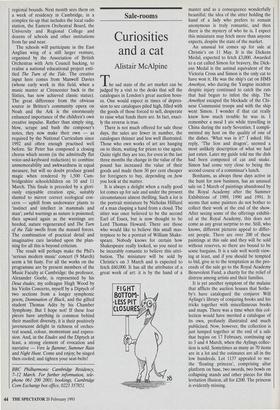Music
Magic in residence
Robin Holloway
In these troubled times even so well- established a feature of our musical life as the BBC's regional orchestras have felt the axe's keenness. So far all is still well, thank goodness. 'Regional' can sound patronis- ing: the standards achieved by the Scottish, Welsh and Ulster bands are high, and the sustained excellence of the Manchester- based BBC Philharmonic (erstwhile BBC Northern) runs a close second to the Cor- poration's principal orchestra in London.
Under the dedicated management of Peter Marchbank and the principal baton of Sir Edward Downes, the Phil gained in the Seventies and Eighties a profile all its own. Recognising that the London orches- tra had something of a duty to represent the latest from Europe and the US and, clearly, that a Glasgow-based body owed a duty to Scottish composers and a Cardiff to Welsh, the Phil concentrated instead upon English repertoire both current and from earlier this century. This was risky: this is just the kind of music, denigrated in the metropolis and unheard of abroad, which has nevertheless survived as a latent main- stream in the hearts of thousands of 'ordi- nary listeners' who, usually in silence, reject the 'challenge' of the official advanced line and cleave to English pastoralism with Celtic edgings — green and pleasant with misty greys and sonorous purples. Such nostalgia can lead to lost causes, as in the all-out championship of the work of George Lloyd, an unregenerate rock of old-style British romanticism undistin- guished by any identifying features. But even such an aberration is generous — the extreme edge of a policy brave in its rejec- tion of fashionable ephemera. Not that the Phil has ever neglected the hard stuff: there was a notable working relationship with Luciano Berio, and they have recently appointed Peter Maxwell Davies as their first-ever associate composer/conductor.
Nowadays the Phil has to do more than get out of its studio and into the market- place. It must show willing and be able to serve the community, collaborating with schools, hospitals, even Strangeways jail (a `captive audience'). Always travelling over the north, they are now bursting the regional bounds. Next month sees them on a week of residency in Cambridge, in a complex tie-up that includes the local radio station, the Eastern Orchestral Board, the University and Regional College and dozens of schools and other institutions from far and near.
The schools will participate in the East Anglian wing of a still larger venture, organised by the Association of British Orchestras with Arts Council backing, to realise a national educational project enti- tled The Turn of the Tide. The creative input here comes from Maxwell Davies (whose early work in this field, when a music master at Cirencester back in the Sixties, has now achieved classic status). The great difference from the obvious source in Britten's community opera on Noah and the Ark is the enormously enhanced importance of the children's own creative impulse. Rather than simply sing, blow, scrape and bash the composer's notes, they now make their own — as required by the National Curriculum since 1992 and often enough practised well before. Sir Peter has composed a closing chorus which seems (in the admittedly flat voice-and-keyboard reduction) to combine unmemorability and awkwardness in equal measure, but will no doubt produce grand magic when rendered by 1,500 Cam- bridgeshire schoolchildren on 10 and 11 March. This finale is preceded by a glori- ously enjoyable creation epic, suitably slanted to mirror correct ecological con- cern — uphill from underwater plants to `instinct and intellect in mammals and man'; awful warnings as nature is poisoned; then upward again as the warnings are heeded, nature regenerated and The Turn of the Tide swells from the massed forces. The combination of practical detail and imaginative care lavished upon the plan- ning for all this is beyond criticism.
The result will perhaps make the Phil's `serious modern music' concert (9 March) seem a bit fusty. For all the works on the programme are by present members of the Music Faculty at Cambridge: the professor, Alexander Goehr, is represented by his Deux etudes, my colleague Hugh Wood by his Violin Concerto, myself by a Diptych of two sections from a longer symphonic poem, Domination of Black, and the gifted student Thomas Ades by his Chamber Symphony. But I hope not! If these four pieces have anything in common behind their manifest diversity, it is their positively juvenescent delight in richness of orches- tral sound, colour, momentum and expres- sion. And, in the Etudes and the Diptych at least, a strong element of evocation and narrative — Vers la flamme; Summer Rain and Night Hunt. Come and enjoy; be singed then cooled; and tighten your seat-belts!
BBC Philharmonic Cambridge Residency, 7-12 March. For further information, tele- phone 061 200 2001; bookings, Cambridge Corn Exchange box office, 0223 357851.



























































 Previous page
Previous page